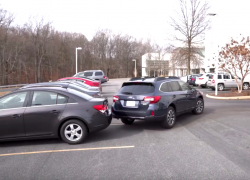
— Rear crash test ratings haven't been something automakers have spent much time focusing on because the technology is relatively new and testing organizations are just beginning to study rear-end crash prevention systems.
The Insurance Institute for Highway Safety (IIHS) is taking the lead, as it does with most crash-related technologies, and has started evaluating rear crash prevention systems to prevent backup incidents.
Rear crash prevention systems typically include at least three technologies.
Parking sensors will warn a driver when the car gets too close to another vehicle or object directly behind the car, typically by providing warning sounds and sometimes seat vibrations.
Rear cross-traffic alerts provide a driver a warning if they are backing up with a vehicle crossing their path.
Rear automatic emergency braking (AEB) systems will automatically apply the brakes if drivers ignore the warnings to stop.
Questions if the systems prevent rear-end crashes may have already been answered in previous research conducted by IIHS using General Motors vehicles.
Researchers discovered a 78 percent decrease in backup crashes reported to police on GM vehicles equipped with rearview cameras, rear parking sensors and rear autobrake systems. In addition, Subaru vehicles had a reduced frequency of backup crash claims by using only autobrake systems.
Although a simple rear-end fender-bender likely won't kill you, the cost incurred can be insane even in the most minor incidents. IIHS did a few tests to learn the estimated cost of rear crashes by using cars with rear autobrake and without it.
Vehicles equipped with rear autobrake never hit anything to cause damage in the first place, but vehicles without autobrake didn't fare as well.
A Cadillac XT5 SUV without rear autobrake backed into a pole and required nearly $3,500 in repairs to the SUV. When a Subaru Outback without autobrake simply backed into the rear bumper of a Chevy Cruze, that little incident caused $1,900 damage to the Outback and $740 damage to the Cruze.
In the rear crash tests, IIHS used six models equipped with rear crash prevention, including rear autobrake:
- 2017 BMW 5 Series
- 2017 Cadillac XT5
- 2017 Infiniti QX60
- 2017 Jeep Cherokee
- 2017 Subaru Outback
- 2017 Toyota Prius
The Outback and XT5 earned "superior" ratings when equipped with rear autobrake, parking sensors and rear cross-traffic alert, followed by the Jeep Cherokee, BMW 5 Series, Infiniti QX60 and Toyota Prius that earned "advanced" ratings when equipped with the same features.
Don't be surprised if your new vehicle doesn't have rear autobrake because IIHS says the feature is optional on only 5 percent and standard on less than 1 percent of 2018 models.
A consumer will have better luck finding a 2018 model with rear cross-traffic alert as an optional feature as it's available on 43 percent of vehicles and standard on 11 percent of 2018 models.
Rear parking sensors are more popular as they are standard on 33 percent and optional on 59 percent of 2018 models.




